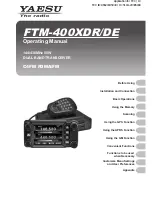
Additional information
17
81
En
If necessary, use a cloth soaked in alcohol, or
a commercially available CD/DVD cleaning kit
to clean a disc more thoroughly. Never use
benzine, thinner or other cleaning agents,
including products designed for cleaning
vinyl records.
Storing discs
Although CDs and DVD discs are more
durable than vinyl records, you should still
take care to handle and store discs correctly.
When you're not using a disc, return it to its
case and store upright. Avoid leaving discs in
excessively cold, humid, or hot environments
(including under direct sunlight).
Don't glue paper or put stickers onto the disc,
or use a pencil, ball-point pen or other sharp-
tipped writing instrument. These could all
damage the disc.
For more detailed care information see the
instructions that come with discs.
Do not load more than one disc into the player
at a time.
Discs to avoid
Discs spin at high speed inside the player. If
you can see that a disc is cracked, chipped,
warped, or otherwise damaged, don't risk
using it in your player—you could end up
damaging the unit.
This unit is designed for use with
conventional, fully circular discs only. Never
use shaped discs with this unit. Pioneer
disclaims all liability arising in connection
with the use of shaped discs.
Using cassette tapes
The tape of a cassette is quite easily damaged
and loose tape can jam in the tape deck
mechanism. If the tape has become
unwound, use a pen or pencil to wind it back
on to the spool.
When not using cassettes, always store in the
case. Store cassettes away from magnetic
fields, excessive heat, humidity, dust or oil.
Before recording on a tape, wind the tape on
past the leader tape (about the first 3 or 4
seconds of each side).
Tapes you should avoid
Since tapes longer than 90 minutes are so
thin, they are more susceptible to jamming in
the tape deck mechanism and other trouble
such as irregular winding. Avoid using
cassette tapes longer than 90 minutes.
XV-EV51.book 81 ページ 2003年5月6日 火曜日 午後2時31分
















































